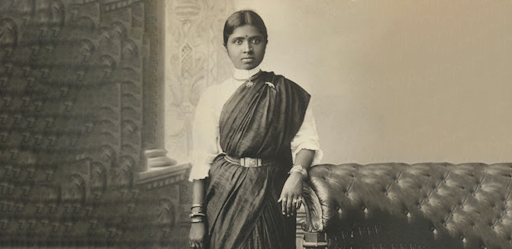Dr Muthulakshmi Reddy was an embodiment of progressive liberalism. She was a staunch advocate of women’s education and was a vehement critic of the Devadasi system. She challenged many traditional societal norms. By championing gender equality she left an indelible mark on South Indian social fabric.
The nineteenth century was a time of significant intellectual and social change in India. Amidst this ferment, Dr. Muthulakshmi Reddy emerged as a leading figure in the South Indian social reform movement. A beacon of social change, she toiled ceaselessly to ameliorate the plight of women and children in India. Her tireless efforts sought to create a more equitable and just society for women, becoming a profound source of inspiration for all those who believed in the transformative power of women.
Muthulakshmi was born in 1886 in the princely state of Pudukkottai (Tamil Nadu). She was the daughter of Narayanaswamy Iyer, the principal of Maharaja’s College in Pudukkottai. Her father recognised her potential and was determined to provide her with an education, even though it was not the norm for girls then. However, his aspirations were thwarted by an early retirement, resulting from conflicts with the state’s Diwan.
Despite this setback in her father’s career, her passion for learning remained undaunted. Even though her mother, Chandrammal wanted her to quit school, Muthulakshmi continued schooling and passed her Lower Secondary Public Examination with the help of her Teacher Balaiah. Societal norms and traditions acted as formidable barriers to women’s education, impeding their pursuit of knowledge. Muthulakshmi, too, bore the brunt of these customs. Nevertheless, her father took proactive measures and arranged for a private tutor to impart education within the confines of their home. This experience allowed Muthulakshmi to contemplate the prevailing social barriers obstructing women’s access to education. During her teenage years, her passion for women’s rights and social justice began to blossom and take root.
In 1902, Dr. Muthulakshmi Reddy defied the odds and passed the Matriculation Examination Due to the lack of hostels for Girls, she had to join the local Men’s Second Grade College for her higher education. Her academic excellence, however, encountered opposition fueled by gender and caste bias. The college principal raised objections, fearing that her presence would dishearten the male students. Even some parents threatened to withdraw their sons if she were allowed to join. However, the Maharajah of Pudukkotai quelled the objections and admitted her, displaying wisdom and progressive thinking. This momentous decision by the Maharajah marked a significant milestone in the annals of women’s education in South India. Dr. Muthulakshmi etched her name in history as the first woman to enroll in the Maharajah’s College for Men, and in 1907, she proudly passed her Intermediate Examination.
In 1907, Dr Muthulakshmi secured admission to the esteemed Madras Medical College, dedicating herself to the pursuit of medicine. As an active participant in gatherings and public meetings, her remarkable work garnered attention, with numerous newspaper articles and magazines highlighting her endeavours. She graduated with honours and worked as a House Surgeon at the Government Hospital for Women and Children in Egmore. Later,, she dutifully returned to her hometown of Pudukkotai, where she wholeheartedly served her community. In 1914, she established her clinic in Madras and became renowned for her exceptional treatment skills.
In 1914, she discovered a kindred spirit in Dr. Sundara Reddi, a physician with liberal thoughts and a visionary outlook. Their marriage was built on mutual respect, and he wholeheartedly supported her medical practice and social work.
In 1925, Dr. Muthulakshmi Reddi received a prestigious scholarship from the Indian Government to study in England. Setting foot in the United Kingdom, she delved into the realm of women’s and children’s diseases, honing her knowledge and skills. After returning to India, she published numerous works on pregnant women, childbirth, and social welfare matters.
The zeal of the Indian freedom movement stirred her soul, and Mahatma Gandhi’s inspiring leadership profoundly impacted her. Under his influence, she actively engaged in the freedom struggle, coordinated efforts with other leaders, and played a crucial role in the movement.
Contemplating the societal conditions prevailing at the time, Dr Muthulakshmi recognised that gender equality could be achieved only through education for women. In 1917, she became a member of the Women’s Indian Association, aligning her vision with trailblazers like Annie Besant, Hira Bai Tata, and Marget Cousins. Additionally, she was actively associated with the Muslim Women’s Association, Madras Seva Sadan, The Madras Vigilance Society, and the Indian Ladies Samaj.
As one of the few women leaders of South India, she ardently fought for India’s liberation from colonial oppression. In 1932, Dr. Muthulakshmi, alongside Gandhiji, attended the Third Round Table Conference in London, gaining significant exposure. Subsequently, in 1934, she participated in the First International Conference of Chicago. Following the passing of Annie Besant, she assumed the presidency of the Women’s Indian Association. Yet, she relinquished the position during the Non-Cooperation movement as a protest against Gandhiji’s arrest.
In 1962, Dr Muthulakshmi Reddi received a momentous appointment to the Madras Legislative Council. This marked the beginning of her lifelong mission to rectify the societal imbalances that hindered women’s rights. Her commendable social work garnered recognition from the Government of India, leading to her inclusion in the Hartog Committee, entrusted with reviewing the condition of women in the country.
During the late 1800s, Dr. Muthulakshmi Reddi boldly stepped forward to lead the fight against the Devadasi system. As a member of the Madras Legislative Council, she vehemently opposed the practice and pledged for its eradication. Organising meetings and gaining support from various organisations, including the Women’s Indian Association and the Devadasi Women’s Association, she also garnered the backing of the Devadasi Community Men’s Association.
In 1936, Dr Muthulakshmi Reddi established the “AVVAI HOME,” a welfare institution in Tiruvannamalai for abandoned children and women. Over time, this home became a place of empowerment, offering vocational training to children and women.
In 1953, she became the Chairman of the State Social Welfare Board of Madras Presidency. During her tenure from 1953 to 1957, she uplifted women from backward classes by providing them with education and healthcare opportunities, and she also played a pivotal role in establishing a separate Children’s Hospital in the Madras Presidency.
Dr. Muthulakshmi Reddi was a trailblazer in every sense, achieving numerous firsts as a woman in India – being the first to gain admission to a men’s college, the first to become a house surgeon in a government hospital, and the first to be elected to the Madras Legislative Council. However, she was more than just a pioneer; she was a true champion for women’s rights. She relentlessly fought to improve the lives of women and children in India, advocating against child marriage, for raising the age of consent for marriage, and women’s voting rights.
She envisioned a world where women would receive equal treatment, have the same opportunities as men, and are free to make their own life choices. Her life’s dedication was directed towards turning this vision into a reality. Dr. Muthulakshmi Reddi’s relentless pursuit of social justice and gender equality paved the way for a more inclusive and progressive India, making her a true visionary champion of liberal ideas.
References
- https://artsandculture.google.com/entity/muthulakshmi-reddy/m09ryvs
- Santhi, S., & Saravanakumar, A. R. (n.d.). Contribution of Dr. Muthulakshmi Reddy to Women Empowerment-A Historical Study. www.ijstr.org
- Kamatchi, M. (2016). MUTHULAKSHMI REDDY: THE FIRST MEDICAL WOMAN PROFESSIONAL IN SOUTH INDIA. Proceedings of the Indian History Congress, 77, 612–623. https://www.jstor.org/stable/26552689
Previous musing: Have We Lost Our Will To Be Free? (1965)


